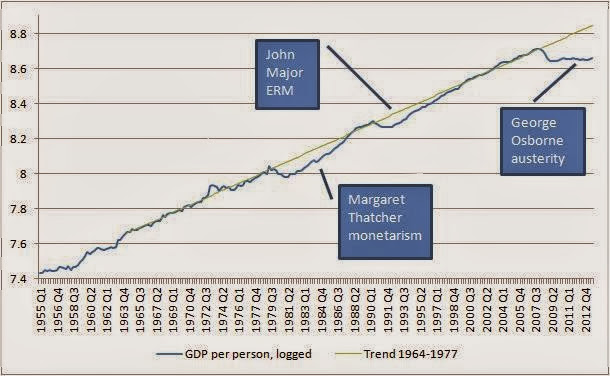Enough time has now passed for there to have been much sober analysis of George Osborne's Autumn Statement. One thing I must confess that I missed at first, probably because it didn't feature in the fanfare of celebration that greeted the upward revisions of his growth forecasts for 2013 and 2014, was the downward revisions of his forecasts for 2015, 2016 and 2017. Growth in 2015 is now expected to be lower than that in 2014. This explains why the so-called 'return of growth' has not done much to improve the Chancellor's deficit reduction projections and why he hasn't taken his foot of the austerity pedal.
Much has been said about the quality and sustainability of this new growth. Many are concerned that it is based on rising consumption, lower savings, falling real incomes and inflating debt bubbles. These concerns have been summed up beautifully by Ann Pettifor in her description of the UK economy as 'Alice in Wongaland'. Some point out that some 6 years later, the economy is still 2% smaller that it was when the crisis began in 2008, making this the slowest recovery on record. What doesn't get quite so much of an airing is the fact that currently the UK economy is some 15% smaller than it would have been if it had continued along its post-war growth path. Simon Wren-Lewis has this chart on his blog in one of his recent posts (see here):
He suggests that this is maybe something that the Labour Party would find useful. I think he is right. What it shows is the pattern of growth per person in the UK since 1955. What is clear is that growth generally sticks very closely to the trend, except during recessions when the economy contracts. Following a recession growth returns but stronger than the trend so that the economy flicks back onto it long term trend growth path as the lost ground is recovered. The exception to this is the current 'Great Recession'.
What is interesting about the recent Autumn Statement is that Osborne is only predicting a return to trend levels of growth, around 2.5% a year, from next year until 2018. That is, the Chancellor himself is saying that the best that the Coalition can do, unlike what's happened after previous recessions, is return us to trend growth, but at a lower level. Or to state it more plainly, Osborne is writing off that 15% of GDP that we lost through the crisis of 2008 and the austerity policies that led to the flatlining of 2010-12. We aren't getting back to that world. 15% of GDP is over £200bn. That's £200bn lost from the UK economy. Oh, I mean that's £200bn lost from the UK economy every year. To put this is context, the Government's annual deficit is around £120bn. How much additional tax revenue would an extra £200bn of national income bring in? Certainly enough to reduce the deficit down to a fraction of its current level and obviate the need for the scale of austerity that is currently being imposed upon us.
If we view things like this, then the Government's continuing deficit represents the failure of the Coalition to deliver the post recession spring back in GDP growth rates that we saw after the recessions of the Thatcher and Major governments. It makes the celebrations of a week or so ago seem rather comic. Indeed Paul Krugman has likened their behaviour to an old Three Stooges sketch where one of trio finds another banging his head against a wall. When he asks why he is doing it he says, 'Because when I stop I feel so much better'. I prefer to see the Coalition as a Football Manager under whose leadership and guidance his Premier League team were relegated 3 seasons on the trot. Miraculously he manages to keep his job as his team starts playing in League Two. Then, after a run of a few decent results, he calls a press conference at which he announces to a stunned nation that these results demonstrate a resounding vindication of the winning strategy he has been pursuing for the last 3 years.
It is of course more tragedy than comedy as the lost 15% or the lost £200bn are not just numbers on a page but real people's lives. People struggling without jobs, without enough decently paid work, struggling with falling living standards and trying to make ends meets with visits to foodbanks and payday lenders. And the real crime is that it didn't need to be like this.
Happy Christmas.
.jpg&container=blogger&gadget=a&rewriteMime=image%2F*)
